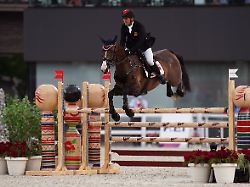“Zhuang Zhuang” at the Olympics?
Chinese clone German horse for equestrian title
01/13/2023 12:17 p.m
China strives for perfection and for brilliant successes in sport. But in equestrian sport this has not been successful so far, also because there is a lack of high-performance horses. Now a company has cloned one without further ado. With “Zhuang Zhuang” Chinese riders should be able to celebrate success.
“Dolly”, the cloned sheep, is famous. Soon everyone may also know “Zhuang Zhuang”, the first cloned horse born in China. It could make a name for itself with successes in equestrian sport, because the China Horse Industry Association wants to approve it for that. “Zhuang Zhuang” is the latest research success of the company Sino Gene.
The animal, born in June 2022, is the clone of a horse named Ursus imported from Germany. This was born in Germany in 1995 and came to China in 2007 into the possession of the Sheerwood Riding Club. Since then it has won numerous prizes at national and international equestrian competitions. “Ursus” and “Zhuang Zhuang” are warm-blooded, they are considered to be particularly willing to perform and well-balanced. Breeder Yin Chuyun also praises her explosive power and endurance. “The similarities between the cloned horse and the donor are more than 90 percent,” she told AFP. “Both are very smart. It learns things very quickly, as if it has experienced them before.”
In China, interest in equestrian sports, especially show jumping, has grown significantly in recent years. However, a lack of high-performance horses and a backlog in breeding technology limit the chances of success. The country has not yet reached the level of leading equestrian nations.
“I’ve spoken to (Chinese) riders who compete in the Olympics. All of them have more than one horse, usually two or three. Each horse costs between a few million and 10 million yuan ($1.5 million)” , Sinogene chief Mi Jidong told AFP. So far, Chinese equestrian sport has been dependent on expensive imports. “Cloning can help lower the price of breeding and raising horses.”
“Statistics show that before 2020, China imported an average of 2,500 horses per year. The total cost of importing a horse, including horse trading, transportation, inspection and quarantine, is very high,” Luan Shu, Sheerwood’s general manager, said in an interview with the World Equestrian Federation FEI in November 2022.
Cloning of sport horses has been legal in several countries since the early 2000s. The world’s first cloned horse was born in Italy in 2003, and the practice is also legal in the US, Argentina, the UK and South Korea. The FEI has allowed clones and their offspring to participate in equestrian sports since 2012. It is therefore quite possible that “Zhuang Zhuang” will actually appear at international tournaments or even the Olympic Games in a few years.
